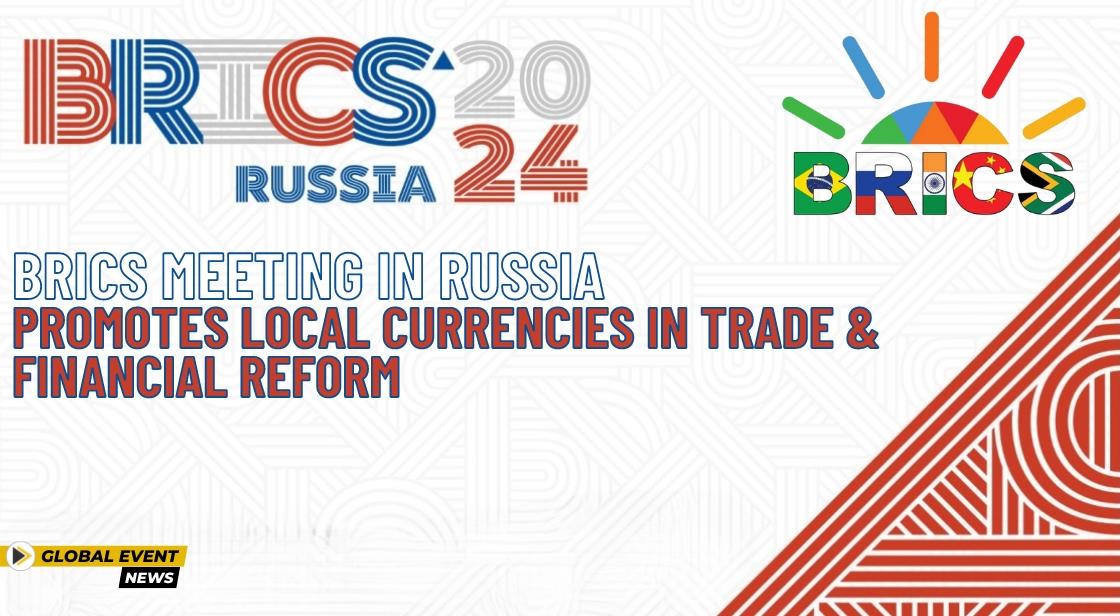BRICS Meeting in Russia Promotes Local Currencies in Trade and Financial Reform

News Synopsis
The BRICS group of nations, now comprising 10 members, recently held a meeting of Foreign Ministers in Nizhny Novgorod, Russia. Key discussions centered on bolstering trade ties within the bloc through increased use of local currencies and reforming the global financial architecture.
Focus on Local Currencies and Financial Reform:
-
The BRICS ministers emphasized the importance of using local currencies for trade and financial transactions between member countries. This move aims to reduce dependence on dominant global currencies and strengthen economic ties within the bloc.
-
The meeting echoed the Johannesburg II Declaration, which tasked financial leaders with exploring the use of local currencies and payment platforms within BRICS.
-
The BRICS nations reiterated their call for reform of international financial institutions like the IMF, advocating for a quota-based system that reflects the economic weight of member countries.
Multilateral Development Banks and Climate Action:
-
The ministers stressed the need for reformed policies and practices by multilateral development banks (MDBs). This reform aims to enhance their lending capacity and better assist developing countries in achieving sustainable development goals and tackling climate change.
-
The meeting encouraged the New Development Bank (NDB), established by BRICS members, to prioritize member-driven projects, explore innovative financing mechanisms, and support climate action initiatives.
-
The ministers agreed to work towards expanding the NDB's membership to include other developing economies.
Energy Cooperation and Global Issues:
-
The BRICS nations expressed their commitment to promoting energy cooperation amongst members, emphasizing the need for resilient global supply chains to ensure access to affordable and sustainable energy sources.
-
While expressing their diverse national stances on the Ukraine conflict, the ministers acknowledged proposals for peaceful resolution through dialogue and diplomacy.
-
The meeting also addressed ongoing conflicts in the Middle East and North Africa (MENA) region.
BRICS Expansion and Russia's Chairmanship:
-
This meeting marked the first gathering of BRICS foreign ministers since the inclusion of new members – Egypt, Iran, UAE, Saudi Arabia, and Ethiopia – in 2023.
-
Russia assumed the chairmanship of BRICS on January 1, 2024, hosting this recent ministerial meeting.
BRICS: A Growing Alliance of Emerging Economies
From Five to Ten: The Expanding BRICS Bloc
BRICS, originally an acronym for Brazil, Russia, India, China, and South Africa, has evolved into a more prominent international organization. In 2023, the group witnessed a significant expansion, welcoming five new members:
-
Egypt
-
Iran
-
United Arab Emirates (UAE)
-
Saudi Arabia
-
Ethiopia
This expansion reflects the group's growing influence on the global stage and its broader focus on economic development and cooperation among emerging economies.
Key Focus Areas of BRICS:
-
Economic Cooperation: BRICS nations aim to foster trade and investment among member countries. This includes promoting the use of local currencies for transactions, reducing reliance on the US dollar, and facilitating financial integration.
-
Global Governance Reform: BRICS advocates for a more equitable global financial architecture that better represents the economic weight of emerging economies. This includes pushing for reforms in institutions like the International Monetary Fund (IMF) and the World Bank.
-
Sustainable Development: BRICS members collaborate on solutions for shared challenges like climate change, poverty reduction, and infrastructure development. They emphasize the importance of increasing lending capacity within Multilateral Development Banks (MDBs) to support these initiatives.
-
Energy Security: The BRICS group recognizes the importance of energy security and clean energy transition. They aim to strengthen global energy supply chains and ensure access to affordable and sustainable energy sources for all member countries.
Recent Developments:
-
The BRICS Foreign Ministers' Meeting held in Nizhny Novgorod, Russia in June 2024, highlighted the group's continued push for local currency trade and global financial reform.
-
Discussions at the meeting also emphasized collaboration in the energy sector and strengthening the lending capacity of MDBs to support development and climate action goals.
-
India actively participated in the meeting, playing a leading role in discussions on economic relations.
The Future of BRICS:
The expansion of BRICS and its focus on key global issues like development, sustainability, and energy security suggest a more prominent role for the group in shaping the future of international relations. As the member countries continue to collaborate and advocate for their interests, BRICS is likely to remain a force to be reckoned with on the global stage.
Conclusion
The BRICS foreign ministers' meeting in Nizhny Novgorod highlighted the bloc's commitment to reforming the global financial architecture, enhancing the use of local currencies in trade, and promoting sustainable development. These initiatives underscore BRICS' strategic vision for a more balanced and inclusive global financial system.
You May Like









